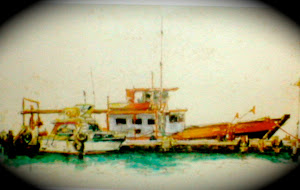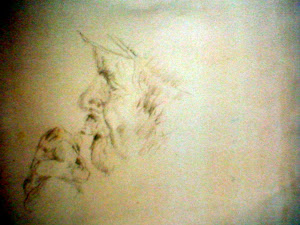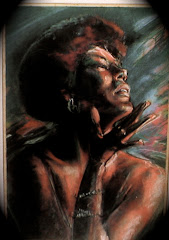These are some thoughts on the New Media, and, Frances Cairncross's predictions about its impact on society, the future and our role in it all.
Some highlights of the 30 manifestoes are: ‘Death of Distance’, ‘More Customized Content’, 'Proliferation of Ideas', 'Loss of Privacy', 'Redistribution of Wages', and,
'Communities of Culture'.
Coming from someone of Time-Distance by shear perspective (age) alone, I personally find much of new technology awfully frightening to say the least. I had said for many years that we are re-wiring the brains our youth. …and actually I've been saying it long enough that it is not an 'are' anymore but a 'have'. That previous statement has successfully and officially been placed in the past. We've done it! The new technology has been assimilated. Resistance was futile!
Now, on with the (Task Question): What makes the New Media Revolutionary?
The invention of Fiber-Optics in the ‘80’s, to me, was the pivot point. Once we learned how to compress a signal, the proverbial Genie was out of the bottle so to speak. Affordability then, became the new challenge.
Soon after that it was about compressing computer power. Enter next phase in the NMR (New Media Revolution) Silicon came into great demand. Apparently, again, size does matter! Make it compact and affordable and everybody will want one.
When the first satellite went up through the atmosphere, the world instantly became smaller. Heck if you hold a mirror just right you can see around a corner. When satellites, Telstar and PanAmSat went into orbit in the early 60's, we could see around the globe! The more information the more ideas; the more ideas the more concepts; “Hey, what if we could connect all the computers in the world so they would talk to each other?” someone said. “They could share information altogether!” said the collaborating voice in the room. Tah-dah! The Internet was born!
Of course this 60 years I speak of is all in this nut-shell report. In the perspective of the overall ‘big-picture’, and the duration humans have been milling around on the planet, we’d all have to agree that was pretty flippin’ fast.
So, to capsulate: Fiber-optics, signal compression, Silicon, smaller & more powerful, Mirrors in the sky and digitizing transmissions, these main factors shaped the computer-world we know today and will continue to form and reshape our thinking hereafter.
Other contributors to the ‘Techno-Age’ where we would not be without: ‘the all mighty mouse’, and of course demand, affordability, and mobility. And, the fact that we already had preceding wondrous inventions, called the Telephone and the Television. Both were contribution marvels by themselves. Yet, their inventors have not been noted and I apologies. With out question their credit is necessary. Thank you ‘Alex G. Bell’, and, ‘John Logie Baird’ if Google is indeed correct and you really did invent Television.
However, that brings up the Q: radio and T.V is about frequency (which is magic in itself) so, is it really the Television that helped bring this new age about, or, was it simply “Programming”?
Part II
The up-side and the down-side of all this electronic digital hocus-pocus has not yet been discussed here which will now be done in brief. These are all simply the writer’s opinion so no boo’s and hiss’s please. 6 of 30 predictions from Frances Cairncross (The Trendspotter's Guide to New Communications) From the book: The Death of Distance
- The Good: #17, 22, 27. Distance learning and on-line classes will be of definite benefit to remote locations. And it does stick the knife in the back of Distance, leaving it to a sad demise. (I’m a believer in time and perspective.) Though, when you are trying to tell someone about how other people and cultures live and then are able show them, or better yet talk with them, it can reveal to us that we are different and what we experience is not all the same. #22 is a toughie. Moving money, and occupations around the globe, some might say this will even-out the economic playing field. I think the Right would not like that, and, the Left would be all for it. Since I don’t get the lion’s share of corporate dollars anyway, I’m for good days pay for good days work. There should be plenty to go around. And if not than there’s a glut somewhere and a little cage-rattling might be just the thing for humanity. #27 Giving indigenous peoples a voice and sharing that voice with the world might give us the perspective that we are losing with Distance dying. Community must endure. Survival of culture is distinctly necessary. As long as truth is priority we should be okay. There, the little ideaist monster just peeked over my shoulder again.
· The Bad: #5 What in the world will Nielsen do for work? Though I jest…unless we get better programs, the personal programming will still be bad; it will just cost to watch it. What might the down side be? Instant-gratification has long been a thorn in the side of patience. And much of human nature is far too comfortable with the word “Want” anyway. Now, you know my cynical side.
- The Ugly: #21 Loss of Privacy. How much more needs to be said? The monitoring of people’s movement cannot be okay for some and not for others. I do think if one does business outside the law, they’re an outlaw, and therefore the law should not apply? ‘Judge not let ye be judged.’ But, that’s a different argument. There has been heaps of futuristic lore in writings and film that warn against the monitoring of people and I fear there is no stopping it. “Be careful the freedoms you give up in the name of security.”
I think I said that.
~ End report ~









1 comment:
so you think you're big stuff now
all internet connected now.
well, keep working on and one day you'll grow into a real contributer of future thinking.
Post a Comment